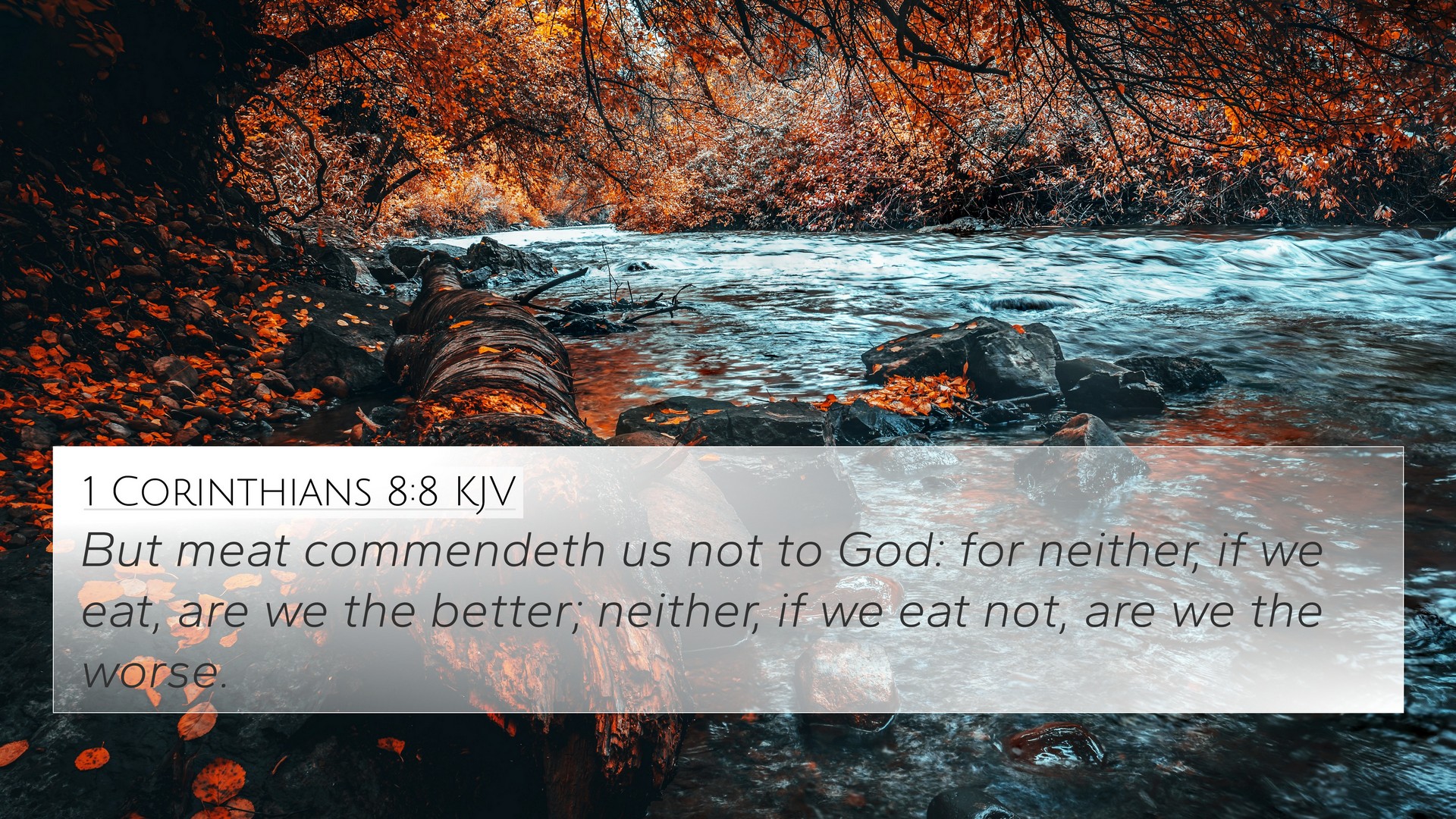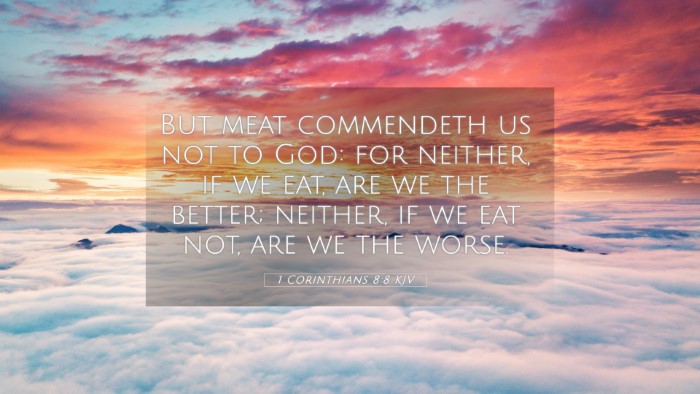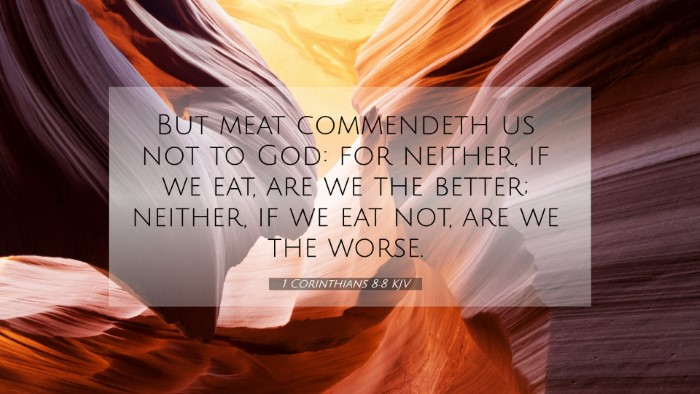Old Testament
Genesis Exodus Leviticus Numbers Deuteronomy Joshua Judges Ruth 1 Samuel 2 Samuel 1 Kings 2 Kings 1 Chronicles 2 Chronicles Ezra Nehemiah Esther Job Psalms Proverbs Ecclesiastes Song of Solomon Isaiah Jeremiah Lamentations Ezekiel Daniel Hosea Joel Amos Obadiah Jonah Micah Nahum Habakkuk Zephaniah Haggai Zechariah Malachi1 Corinthians 8:8 Similar Verses
1 Corinthians 8:8 Cross References
But meat commendeth us not to God: for neither, if we eat, are we the better; neither, if we eat not, are we the worse.
Uncover the Rich Themes and Topics of This Bible Verse
Listed below are the Bible themes associated with 1 Corinthians 8:8. We invite you to explore each theme to gain deeper insights into the Scriptures.
1 Corinthians 8:8 Cross Reference Verses
This section features a detailed cross-reference designed to enrich your understanding of the Scriptures. Below, you will find carefully selected verses that echo the themes and teachings related to 1 Corinthians 8:8 KJV. Click on any image to explore detailed analyses of related Bible verses and uncover deeper theological insights.

Romans 14:17 (KJV) »
For the kingdom of God is not meat and drink; but righteousness, and peace, and joy in the Holy Ghost.

Hebrews 13:9 (KJV) »
Be not carried about with divers and strange doctrines. For it is a good thing that the heart be established with grace; not with meats, which have not profited them that have been occupied therein.
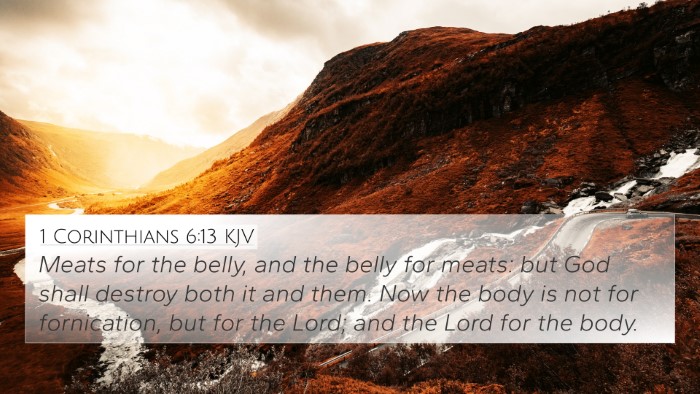
1 Corinthians 6:13 (KJV) »
Meats for the belly, and the belly for meats: but God shall destroy both it and them. Now the body is not for fornication, but for the Lord; and the Lord for the body.
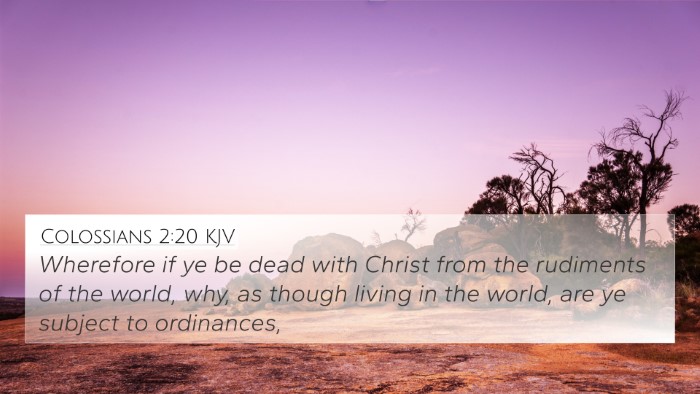
Colossians 2:20 (KJV) »
Wherefore if ye be dead with Christ from the rudiments of the world, why, as though living in the world, are ye subject to ordinances,
1 Corinthians 8:8 Verse Analysis and Similar Verses
Understanding 1 Corinthians 8:8
Verse: 1 Corinthians 8:8
"But food does not commend us to God; neither if we eat are we the better, nor if we do not eat are we the worse."
Summary of Insights
This verse, taken from Paul’s first epistle to the Corinthians, addresses the complex relationship between food, idolatry, and faith. The Apostle Paul emphasizes the insignificance of food in the eyes of God, indicating that dietary choices do not bring one closer or further from divine favor. This message is particularly pertinent in the context of spiritual maturity and the sensitive nature of Christian liberty.
Insights from Commentaries
Matthew Henry’s Commentary
Matthew Henry explains that the issue of food offered to idols is prevalent among the Corinthians and creates divisions within the church. He notes that while some believe eating such food is appropriate due to their knowledge that idols lack true power, others, with weaker consciences, may be led astray. Paul’s assertion that food does not commend us to God serves to remind believers that their standing with God is not dependent on external practices but rather on faith and obedience.
Albert Barnes’ Notes
Albert Barnes further clarifies that the power of food to alter one’s spiritual status is non-existent. He indicates that Paul’s teaching focuses on love and consideration for others, especially those with a weaker faith. It is critical for stronger believers to avoid actions that might lead the weaker ones into sin, highlighting the importance of communal faith over individual liberty.
Adam Clarke’s Commentary
Adam Clarke points out that dietary laws were a contentious subject in the early Church, especially concerning what was permissible. He reinforces Paul’s point that moral and spiritual conditions are not influenced merely by what we consume. Clarke emphasizes that it is the heart and intention behind actions that truly matters to God, not the actions themselves.
Key Themes
- Christian Liberty: The freedom believers have in Christ concerning dietary choices.
- Consideration for Others: The importance of being mindful of those whose faith may be weaker.
- Faith over Ritual: A reminder that God prioritizes internal faith over external rituals.
- Idolatry: The relationship between food and idolatrous practices in the context of early Christianity.
Cross-References
This verse connects with several other biblical texts that explore similar themes. Here are 7-10 pertinent cross-references:
- Romans 14:17: "For the kingdom of God is not eating and drinking, but righteousness and peace and joy in the Holy Spirit."
- 1 Timothy 4:4-5: "For every creature of God is good, and nothing is to be refused if it is received with thanksgiving; for it is sanctified by the word of God and prayer."
- Galatians 5:1: "Stand fast therefore in the liberty by which Christ has made us free, and do not be entangled again with a yoke of bondage."
- Colossians 2:16-17: "So let no one judge you in food or in drink, or regarding a festival or a new moon or sabbaths, which are a shadow of things to come..."
- Mark 7:18-19: "So He said to them, 'Are you thus without understanding? Do you not perceive that whatever enters a man from outside cannot defile him...'"
- 1 Corinthians 10:23: "All things are lawful for me, but not all things are helpful; all things are lawful for me, but not all things edify."
- Matthew 15:11: "Not what goes into the mouth defiles a man; but what comes out of the mouth, this defiles a man."
Conclusion
1 Corinthians 8:8 offers a valuable perspective on the significance of food within the framework of faith. The emphasis is on understanding the liberty believers have in Christ, and the call to act with love and consideration for fellow believers who may struggle with their faith. Through a combination of insights from various public domain commentaries, we see that the Apostle Paul was advocating for a community united in love, prioritizing spiritual truths over mere rituals.
